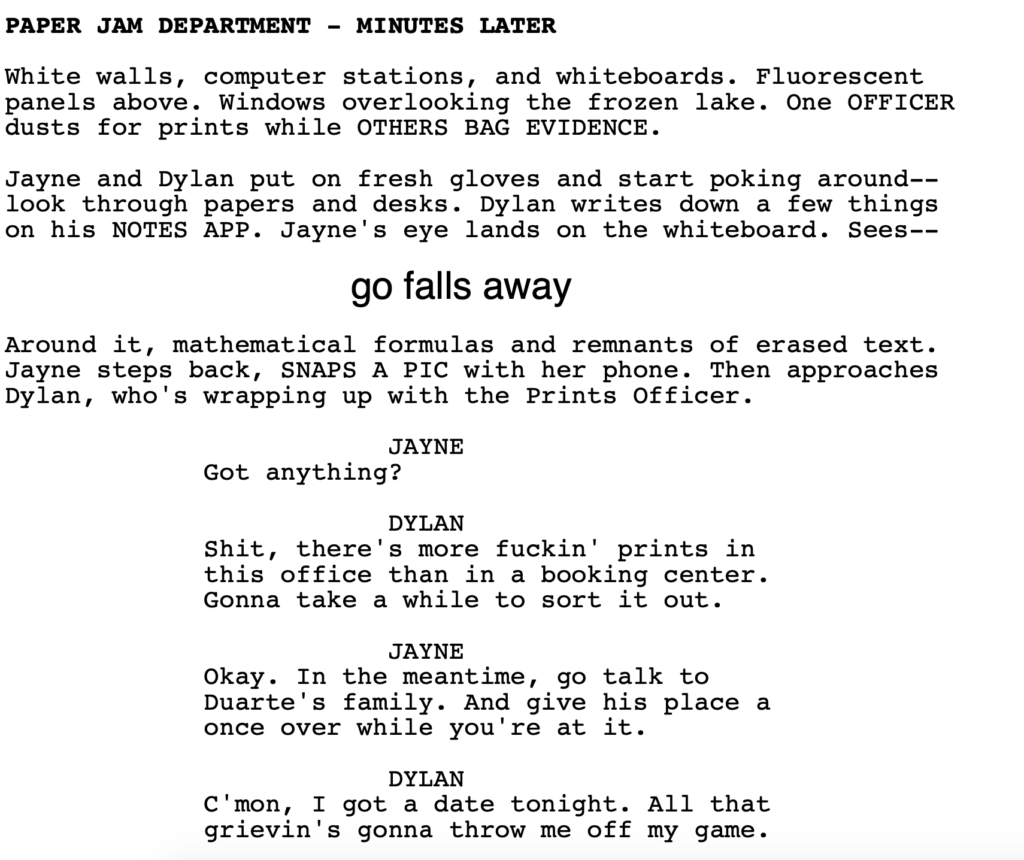Genre: Comedy
Premise: A mystery about what paper jams can teach us about life. After an inexperienced detective starts investigating a death at the Paper Jam department of a major corporation on the verge of its centennial, she unwittingly embarks on a life-altering spiritual journey that unearths her small town’s dark secrets.
About: This script finished in the 11th slot on last year’s Black List. This is the second time Filipe F. Coutinho has made the Black List. He made it last year with his script, Whittier. Coutinho was mentored by Beau Willimon, who created House of Cards.
Writer: Filipe F. Coutinho
Details: 126 pages
 Daddario for Jayne?
Daddario for Jayne?
I’ve been looking forward to reading this.
I love when writers take a highly specific subject matter and build a fun story around it. And I thought it was funny that the writer went so far as to say that our subject matter – paper jams – could actually teach us something about life.
And then, of course, there’s my memory of the greatest comedy scene ever shot, which was the guys in Office Space taking the printer out to a field and bashing it to pieces to the sweet vocals of The Geto Boys. Ever since then, printers have been in the team photo for the funniest things you could build a comedy scene around.
So I think this script has potential. Let’s see if I’m right.
Our movie is set in the small town of Fairport where the Von Brandt Paper Company has been operating for 100 years. The company specializes in making printers. More specifically, Von Brandt is one of the leaders in the industry for troubleshooting paper jams.
In fact, it has an entire department dedicated to fixing paper jams. As we’re told, paper jams are incredibly complex. Here, one of the characters explains it to us: “Paper isn’t manufactured, it’s processed. And that process is complex. First, you gotta turn the trees into wood chips. Then, you mash ’em into pulp and bleach it. And then you run it through screens and chemicals to remove all bio gunk until only water and wood fiber remain. That’s just for starters. Now consider this – in Spain, paper’s made from eucalyptus, but in Kentucky, Southern pine. And they’re expected to go through the exact same machine without any issues… Seems challenging enough, huh? Now multiply that by a million types of paper and factor in the 12 thousand steps that happen from the moment you hit ‘print’ to the moment the sheet lands on the tray. You ask me, it’s a miracle paper isn’t jamming all the time.”
Anyway, one day, a worker named Duarte Alves sees something come into his office and makes a run for it. He goes to the paper jam cemetery and watches as a gigantic industrial printer is pushed on top of him and he dies.
Cut to a day later an we meet detective Jayne Brubaker. Jayne is a no-nonsense type of gal. And while everyone else seems to think this was some sort of accident, Jayne believes there’s more at play here. So she starts interviewing all the people who work at Von Brandt. What she learns is that this place is so obsessed with solving the world’s paper jam problem that they’ve become blinded to just how severely this is affecting their employees. Because it isn’t long before another employee, Chad, dies mysteriously.
Just when Jayne starts making headway on the case, her boss, aka her father, comes in and says “Slow down.” He explains that Von Brandt is all Fairport has. If you expose it as some sort of evil murderous place, you could destroy the entire town. Jayne then has to decide if she wants to keep the status quo or do what’s right. A decision that becomes a lot weirder when Elvis enters the picture. Elvis, you say? Welcome to Jambusters.
One of the harder screenwriting things to discuss in any helpful way is “voice” and “writing style.” These are so personal and so subjective, the extent to which you can dissect comes down to saying you either like the style or you don’t.
But it’s a relevant discussion because it has an outsized effect on the read. Writing styles change how a story moves through your brain. To give you an example, imagine a story about a guy who moves back to his hometown after being gone for 20 years.
Imagine Kenneth Lonergan (Manchester by the Sea) writing that movie and then imagine Quentin Tarantino writing that movie. You’re envisioning two completely different movies in your head, right? That’s the outsized effect of writing style.
I bring this up because today’s script has a very chatty style to it. It’s kind of like reading someone with a colorful personality who likes to talk a lot and who has ADD. Here’s a quick example from the screenplay…

There’s nothing wrong with this writing style. I actually prefer it to the opposite, which is the super-simplified, “only-the-facts-ma’am” style. With that said, this over-stimulated style can start to grate on the reader if the story isn’t keeping up with it. Because it does take a lot of effort to read, which readers don’t like. So you start to feel like, I’m having to work harder than I usually do to get though something that shouldn’t be taking this much energy out of me.
And I guess this gets into a bigger debate about what screenwriting really is. It started out as purely a blueprint to make a movie. There was no personality at all in the writing because how does ‘personality’ help the set workers know how to dress the set? If you want the set to look a certain way, give us the facts and we’ll make it look that way
Of course, that changed over time, because the screenwriting business got more competitive and writers realized they could better keep a reader’s interest by adding a little personalization to the writing. They could use their voice to give their screenplays a little more pop.
It’s just important to remember that there’s a line by which you don’t want to cross. And that line is when the reader feels like they’re working harder than they want to to understand what’s going on.
And that was definitely going on here. Not a lot. But enough that I started to get aggravated. It’s not an accident that this script is 16 pages too long. What’s that old video series that used to get all that play? Girls Gone Wild? Well, this is Voice Gone Wild. Let’s not let this voice take off its off every ten seconds.
With that said, Coutinho makes a smart decision. He doesn’t just follow the daily exploits of someone who works at a printer factory. He gives us a dead body. I’ve said it before and I’ll say it again. If your idea feels tame in any way, introduce a dead body. A dead body creates mystery and it introduces PURPOSE in to the story. Now someone has to look into that dead body. They have to find out how they died or how they were murdered. Which means we have a goal.
And I did enjoy some of the philosophical stuff about paper jams in comparison to the meaning of life. It did get a little weird, but it was amusing.
In the end, though, this script makes you wade through so much text to get to the relevant plot points, that it violates one of the most important rules of screenwriting, which is that a script is supposed to entertain the reader. The second it crosses over into making them work, you’ve lost them.
And I just felt like I was having to read way too much stuff to get to the point. I suppose watching Jayne share an impromptu dance with her husband isn’t violating any screenwriting laws. But I sure did ask myself after I read it, “Was that really necessary?” I found myself thinking that a lot.
This script is hard to describe. But if I were pressed to, I’d say it’s I Heart Huckabees meets Chinatown by way of Max Landis. If that sounds like your paper jam, check it out and let me know what you think!
[ ] What the hell did I just read?
[x] wasn’t for me
[ ] worth the read
[ ] impressive
[ ] genius
What I learned: “He’s gangly, with hips like doorknobs and unruly, brittle hair.” Sometimes we writers write stuff that looks good on paper but doesn’t make sense. And for whatever reason, we favor the “looks good” part over the “makes sense” part. Don’t ever do this. The “makes sense” part is always more important. Nobody knows what “hips like doorknobs” looks like. It doesn’t make sense which means, even if you have to switch in a more boring description that *does* make sense, you do so. Cause making sense is always the priority.

